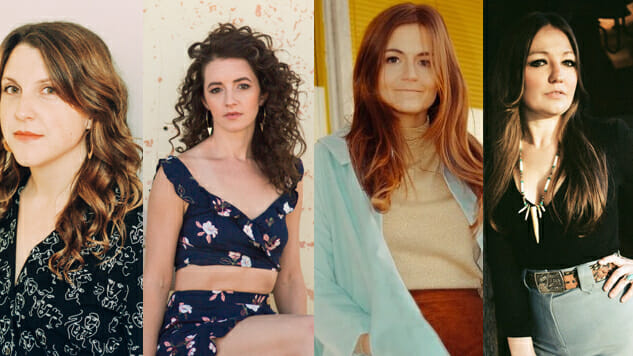These Rising Nashville Stars Stick Together The Same Way We Do—With A Group Message
Erin Rae, Kelsey Waldon and other up-and-comers don’t just support each other from afar—they’re actually friends. And that makes all the difference in the world.
Photos by Marcus Maddox, Laura E. Partain, Angelina Castillo & Matt Wignall
The first thing you’ll notice about the women driving Nashville’s music scene today: They all like each other. It’s not polite admiration, the way people in any industry generally tend to play diplomats and say nothing but blandly cordial things about one another, but honest liking, where professional respect intersects with affection.
Sitting across from me at Dose Coffee’s location in Nashville’s Riverside Village, Erin Rae’s phone is popping off. She’s on a group text, she says, with Caroline Spence, Michaela Anne and Kelsey Waldon. Caroline is in the U.K., updating the gang on her travels. “She says she’s in a hotel by Heathrow,” Rae informs me. “She just landed over there. She’s knitting and watching the BBC.” This seems like the kind of perfunctory bulletin only shared between bonded people, to whom details like accommodations abroad actually matter.
But notes about itineraries and craft projects comprise just a portion of the text chain’s contents: Stories about bummer ticket sales or road trips gone awry make up the communications, too. “We’re always checking in on each other,” Anne explains a week after my chat with Rae. “We all feel really grateful to know that we have a network where we’re able to share the hardships and disappointments.” The way Anne talks about her ongoing conversations with Rae, Spence, and Waldon sounds awfully close to therapy: They function as a safe space for being vulnerable about life’s letdowns. There’s no need for posturing, no harm in venting. Instead there’s compassion and empathy for the rough times.
With the bad comes the good, of course—all the successes and validations that make the musician’s life worth all the hassle and hustle. Ultimately, it’s neither one nor the other that demonstrates the text chain’s great worth; it’s both. That’s networking. That’s peer support. That’s Nashville, at its best.
“It’s an unfortunately unique thing to have that really genuinely supportive group of not just friends, but friends who completely get what you’re going through,” says Anne, who moved to Nashville from New York City five years ago after attending the School of Jazz at The New School (formerly The New School for Jazz and Contemporary Music). But even rarer than the common experience is the common admiration. “If I didn’t know them, I’m genuinely fans of theirs,” Anne adds. “I actually put on their records. I actually listen to them! That’s really a unique and amazing thing, I think.”
As Nashville is home to countless musicians with more chops in their pinkies than most have in their entire bodies, this shouldn’t come as much of a surprise. Factor in that Nashville’s 2019 slate was brimming over with terrific releases, and the surprise is blunted further: Anne’s Desert Dove, Waldon’s White Noise/White Lines, Yola’s Walk Through Fire, Lillie Mae’s Other Girls, the Highwomen’s self-titled record, Miranda Lambert’s Wildcard, Maren Morris’ Girl. It’s a long list. Of course Music City’s songwriters listen to each other’s work. They share zip codes and callings, and they’re all really, really good at what they do.
But there’s something else at work here, something beyond affection and esteem: The magnetizing effects of likemindedness. Identifying women making music in Nashville as “women” first and “musicians” second is déclassé. That language reinforces the idea that male musicians are straight-up musicians, whereas women (and gender nonconforming people) make up their own musical subcategory. But women in the music business still face more uphill challenges than Sisyphus. In Nashville specifically, the sheer volume of talent on the XX spectrum, combined with gender discrepancies in the field, make these otherwise gauche distinctions at least a temporary necessity. When asked why the city’s country scene today is shaped predominantly by women, Doug Hall of Nashville’s Big Feat PR slyly remarks that it’s because “that’s where the talent is.” He’s half-joking, but the other half is the stone-cold truth.